Analyzing the Merits of College Education and Liberal Arts Study
VerifiedAdded on 2023/05/27
|5
|1101
|58
Essay
AI Summary
This essay examines the significance of a college degree in contemporary society, addressing the debate over its necessity for entering the middle class. While some scholars emphasize ethical and moral values, recent studies highlight the economic advantages of a college education. The essay explores techniques for assessing the intangible value of college, including improved job satisfaction, social interaction, and reduced crime rates. It also discusses the importance of writers clarifying misperceptions about liberal arts, particularly as parents increasingly focus on career-oriented degrees. The paper further questions whether too many individuals are pursuing college, emphasizing the need for colleges to motivate students with core knowledge and the value of liberal education. The essay concludes by advocating for a balanced approach that recognizes the multifaceted benefits of higher education.
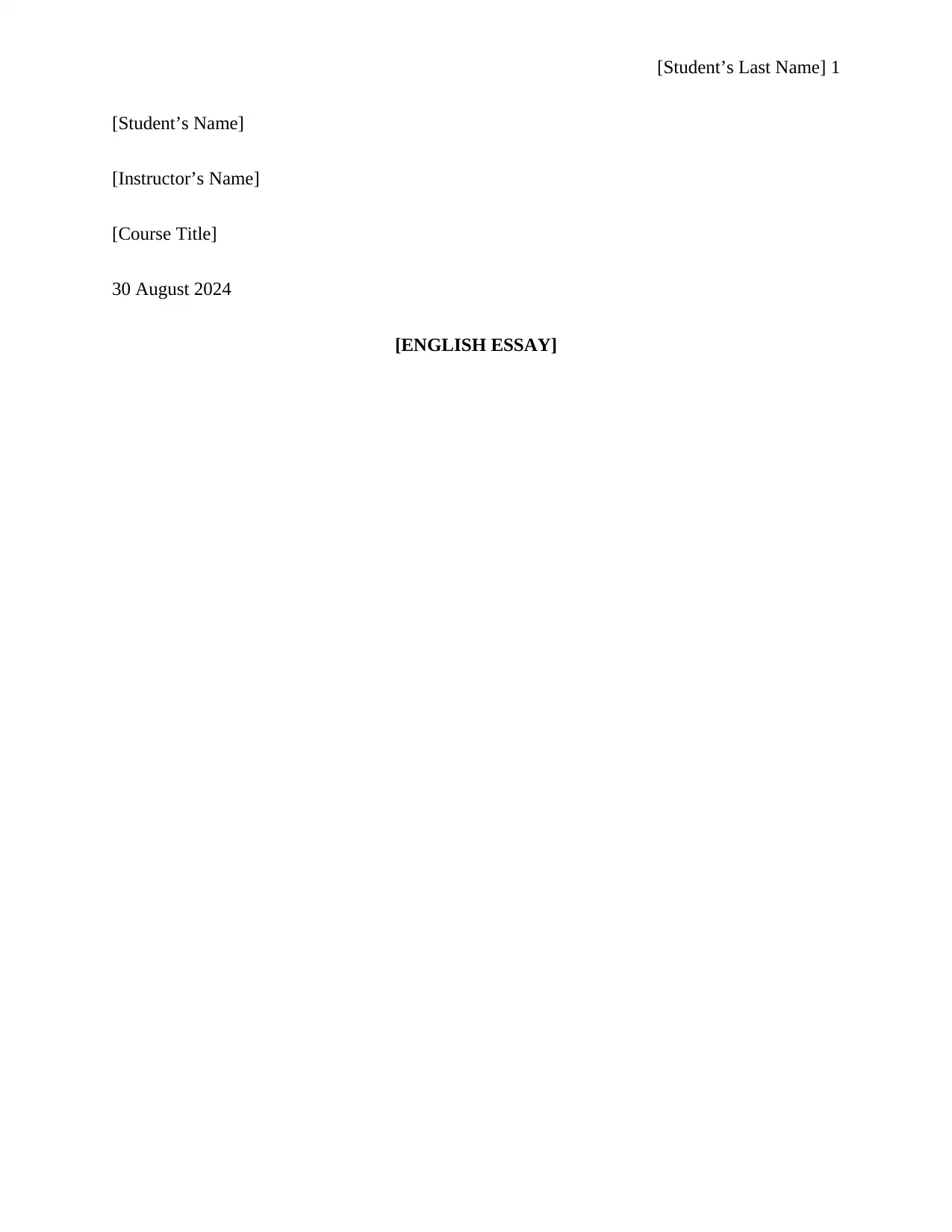
[Student’s Last Name] 1
[Student’s Name]
[Instructor’s Name]
[Course Title]
30 August 2024
[ENGLISH ESSAY]
[Student’s Name]
[Instructor’s Name]
[Course Title]
30 August 2024
[ENGLISH ESSAY]
Paraphrase This Document
Need a fresh take? Get an instant paraphrase of this document with our AI Paraphraser
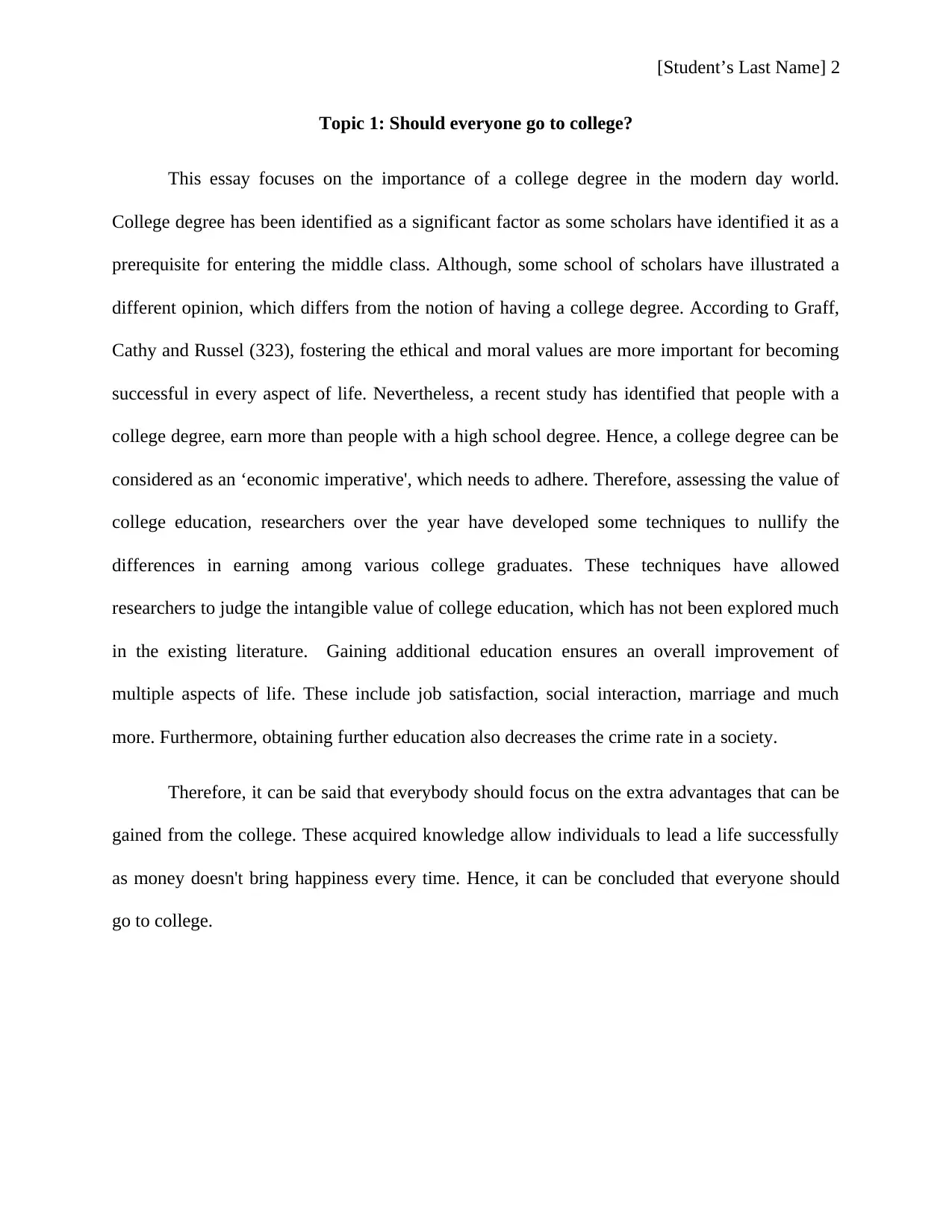
[Student’s Last Name] 2
Topic 1: Should everyone go to college?
This essay focuses on the importance of a college degree in the modern day world.
College degree has been identified as a significant factor as some scholars have identified it as a
prerequisite for entering the middle class. Although, some school of scholars have illustrated a
different opinion, which differs from the notion of having a college degree. According to Graff,
Cathy and Russel (323), fostering the ethical and moral values are more important for becoming
successful in every aspect of life. Nevertheless, a recent study has identified that people with a
college degree, earn more than people with a high school degree. Hence, a college degree can be
considered as an ‘economic imperative', which needs to adhere. Therefore, assessing the value of
college education, researchers over the year have developed some techniques to nullify the
differences in earning among various college graduates. These techniques have allowed
researchers to judge the intangible value of college education, which has not been explored much
in the existing literature. Gaining additional education ensures an overall improvement of
multiple aspects of life. These include job satisfaction, social interaction, marriage and much
more. Furthermore, obtaining further education also decreases the crime rate in a society.
Therefore, it can be said that everybody should focus on the extra advantages that can be
gained from the college. These acquired knowledge allow individuals to lead a life successfully
as money doesn't bring happiness every time. Hence, it can be concluded that everyone should
go to college.
Topic 1: Should everyone go to college?
This essay focuses on the importance of a college degree in the modern day world.
College degree has been identified as a significant factor as some scholars have identified it as a
prerequisite for entering the middle class. Although, some school of scholars have illustrated a
different opinion, which differs from the notion of having a college degree. According to Graff,
Cathy and Russel (323), fostering the ethical and moral values are more important for becoming
successful in every aspect of life. Nevertheless, a recent study has identified that people with a
college degree, earn more than people with a high school degree. Hence, a college degree can be
considered as an ‘economic imperative', which needs to adhere. Therefore, assessing the value of
college education, researchers over the year have developed some techniques to nullify the
differences in earning among various college graduates. These techniques have allowed
researchers to judge the intangible value of college education, which has not been explored much
in the existing literature. Gaining additional education ensures an overall improvement of
multiple aspects of life. These include job satisfaction, social interaction, marriage and much
more. Furthermore, obtaining further education also decreases the crime rate in a society.
Therefore, it can be said that everybody should focus on the extra advantages that can be
gained from the college. These acquired knowledge allow individuals to lead a life successfully
as money doesn't bring happiness every time. Hence, it can be concluded that everyone should
go to college.
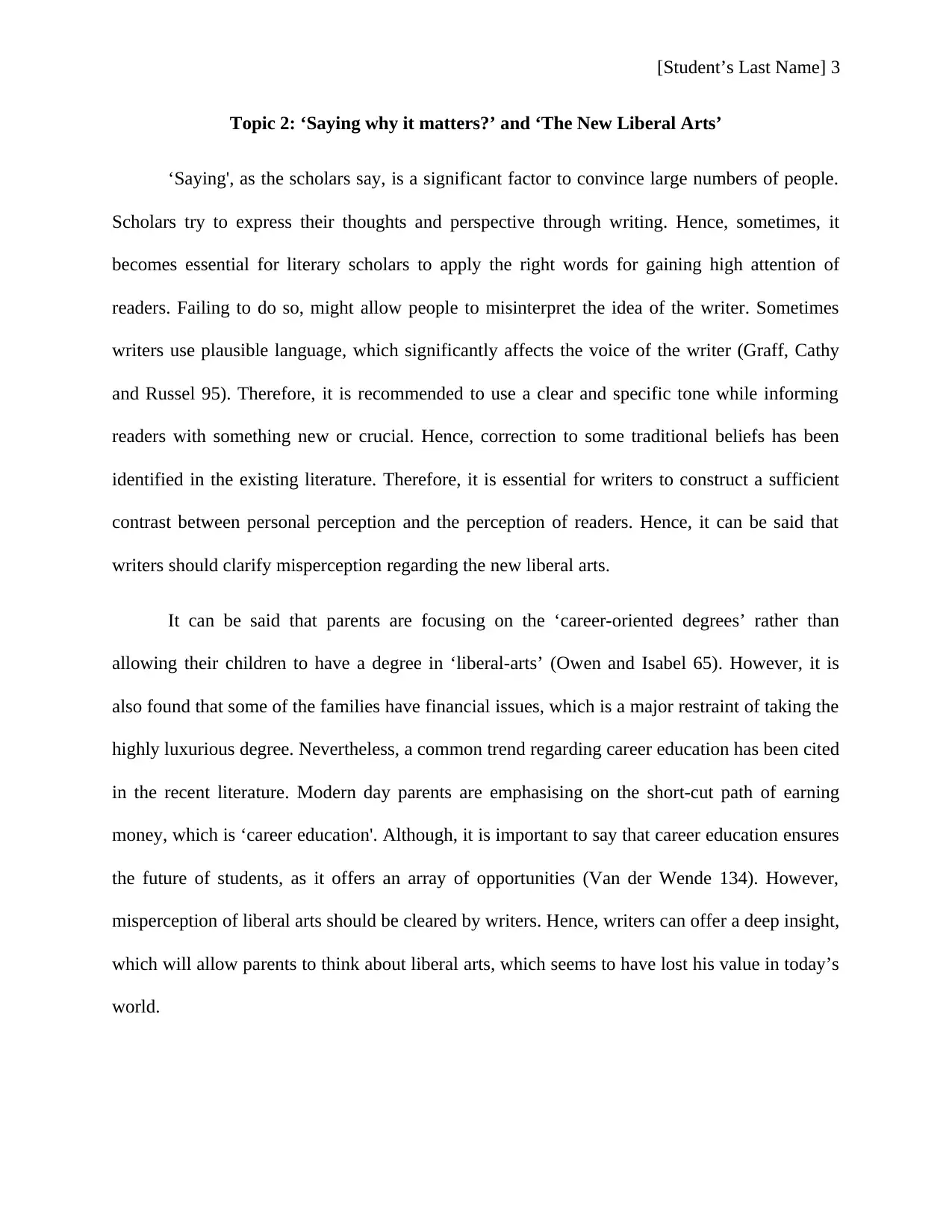
[Student’s Last Name] 3
Topic 2: ‘Saying why it matters?’ and ‘The New Liberal Arts’
‘Saying', as the scholars say, is a significant factor to convince large numbers of people.
Scholars try to express their thoughts and perspective through writing. Hence, sometimes, it
becomes essential for literary scholars to apply the right words for gaining high attention of
readers. Failing to do so, might allow people to misinterpret the idea of the writer. Sometimes
writers use plausible language, which significantly affects the voice of the writer (Graff, Cathy
and Russel 95). Therefore, it is recommended to use a clear and specific tone while informing
readers with something new or crucial. Hence, correction to some traditional beliefs has been
identified in the existing literature. Therefore, it is essential for writers to construct a sufficient
contrast between personal perception and the perception of readers. Hence, it can be said that
writers should clarify misperception regarding the new liberal arts.
It can be said that parents are focusing on the ‘career-oriented degrees’ rather than
allowing their children to have a degree in ‘liberal-arts’ (Owen and Isabel 65). However, it is
also found that some of the families have financial issues, which is a major restraint of taking the
highly luxurious degree. Nevertheless, a common trend regarding career education has been cited
in the recent literature. Modern day parents are emphasising on the short-cut path of earning
money, which is ‘career education'. Although, it is important to say that career education ensures
the future of students, as it offers an array of opportunities (Van der Wende 134). However,
misperception of liberal arts should be cleared by writers. Hence, writers can offer a deep insight,
which will allow parents to think about liberal arts, which seems to have lost his value in today’s
world.
Topic 2: ‘Saying why it matters?’ and ‘The New Liberal Arts’
‘Saying', as the scholars say, is a significant factor to convince large numbers of people.
Scholars try to express their thoughts and perspective through writing. Hence, sometimes, it
becomes essential for literary scholars to apply the right words for gaining high attention of
readers. Failing to do so, might allow people to misinterpret the idea of the writer. Sometimes
writers use plausible language, which significantly affects the voice of the writer (Graff, Cathy
and Russel 95). Therefore, it is recommended to use a clear and specific tone while informing
readers with something new or crucial. Hence, correction to some traditional beliefs has been
identified in the existing literature. Therefore, it is essential for writers to construct a sufficient
contrast between personal perception and the perception of readers. Hence, it can be said that
writers should clarify misperception regarding the new liberal arts.
It can be said that parents are focusing on the ‘career-oriented degrees’ rather than
allowing their children to have a degree in ‘liberal-arts’ (Owen and Isabel 65). However, it is
also found that some of the families have financial issues, which is a major restraint of taking the
highly luxurious degree. Nevertheless, a common trend regarding career education has been cited
in the recent literature. Modern day parents are emphasising on the short-cut path of earning
money, which is ‘career education'. Although, it is important to say that career education ensures
the future of students, as it offers an array of opportunities (Van der Wende 134). However,
misperception of liberal arts should be cleared by writers. Hence, writers can offer a deep insight,
which will allow parents to think about liberal arts, which seems to have lost his value in today’s
world.
⊘ This is a preview!⊘
Do you want full access?
Subscribe today to unlock all pages.

Trusted by 1+ million students worldwide
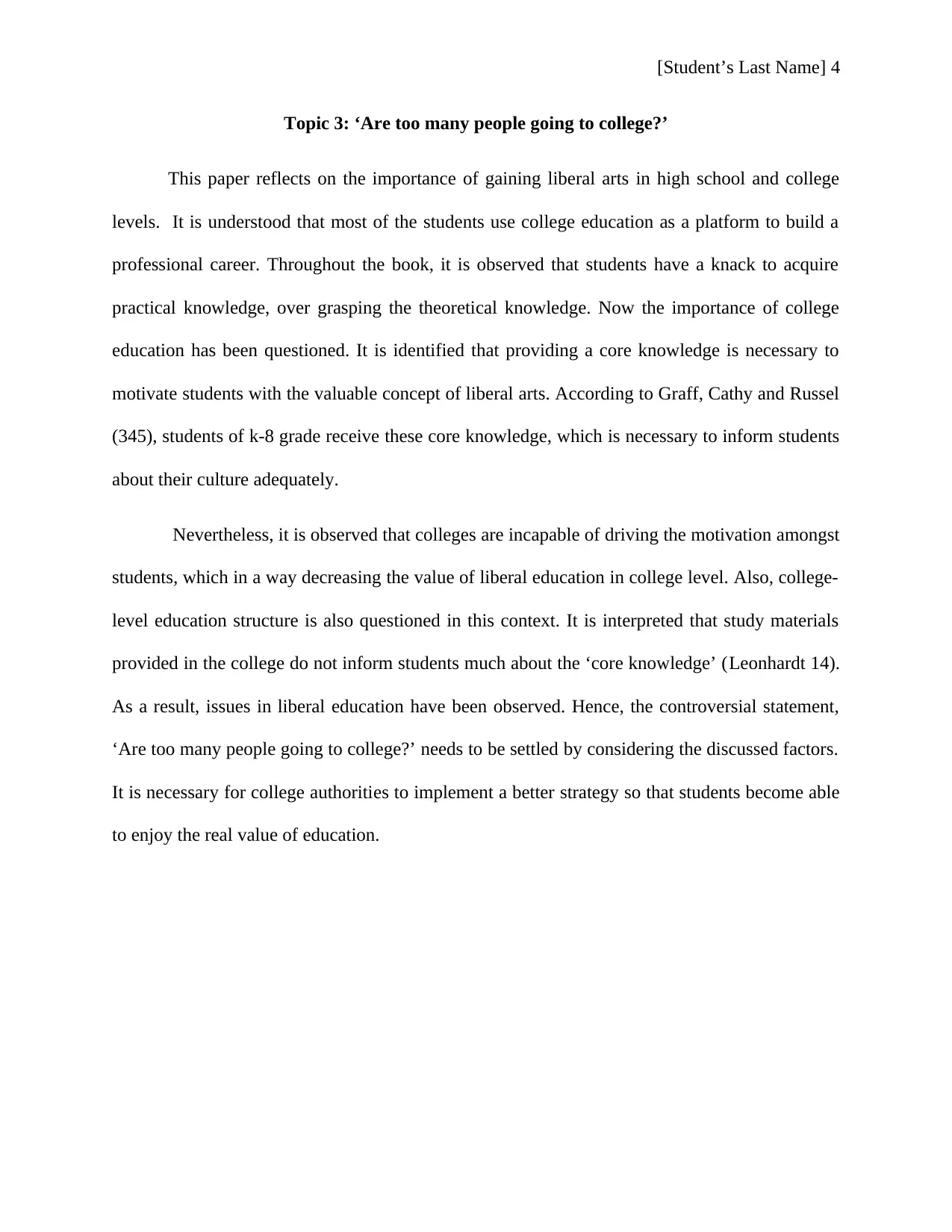
[Student’s Last Name] 4
Topic 3: ‘Are too many people going to college?’
This paper reflects on the importance of gaining liberal arts in high school and college
levels. It is understood that most of the students use college education as a platform to build a
professional career. Throughout the book, it is observed that students have a knack to acquire
practical knowledge, over grasping the theoretical knowledge. Now the importance of college
education has been questioned. It is identified that providing a core knowledge is necessary to
motivate students with the valuable concept of liberal arts. According to Graff, Cathy and Russel
(345), students of k-8 grade receive these core knowledge, which is necessary to inform students
about their culture adequately.
Nevertheless, it is observed that colleges are incapable of driving the motivation amongst
students, which in a way decreasing the value of liberal education in college level. Also, college-
level education structure is also questioned in this context. It is interpreted that study materials
provided in the college do not inform students much about the ‘core knowledge’ (Leonhardt 14).
As a result, issues in liberal education have been observed. Hence, the controversial statement,
‘Are too many people going to college?’ needs to be settled by considering the discussed factors.
It is necessary for college authorities to implement a better strategy so that students become able
to enjoy the real value of education.
Topic 3: ‘Are too many people going to college?’
This paper reflects on the importance of gaining liberal arts in high school and college
levels. It is understood that most of the students use college education as a platform to build a
professional career. Throughout the book, it is observed that students have a knack to acquire
practical knowledge, over grasping the theoretical knowledge. Now the importance of college
education has been questioned. It is identified that providing a core knowledge is necessary to
motivate students with the valuable concept of liberal arts. According to Graff, Cathy and Russel
(345), students of k-8 grade receive these core knowledge, which is necessary to inform students
about their culture adequately.
Nevertheless, it is observed that colleges are incapable of driving the motivation amongst
students, which in a way decreasing the value of liberal education in college level. Also, college-
level education structure is also questioned in this context. It is interpreted that study materials
provided in the college do not inform students much about the ‘core knowledge’ (Leonhardt 14).
As a result, issues in liberal education have been observed. Hence, the controversial statement,
‘Are too many people going to college?’ needs to be settled by considering the discussed factors.
It is necessary for college authorities to implement a better strategy so that students become able
to enjoy the real value of education.
Paraphrase This Document
Need a fresh take? Get an instant paraphrase of this document with our AI Paraphraser
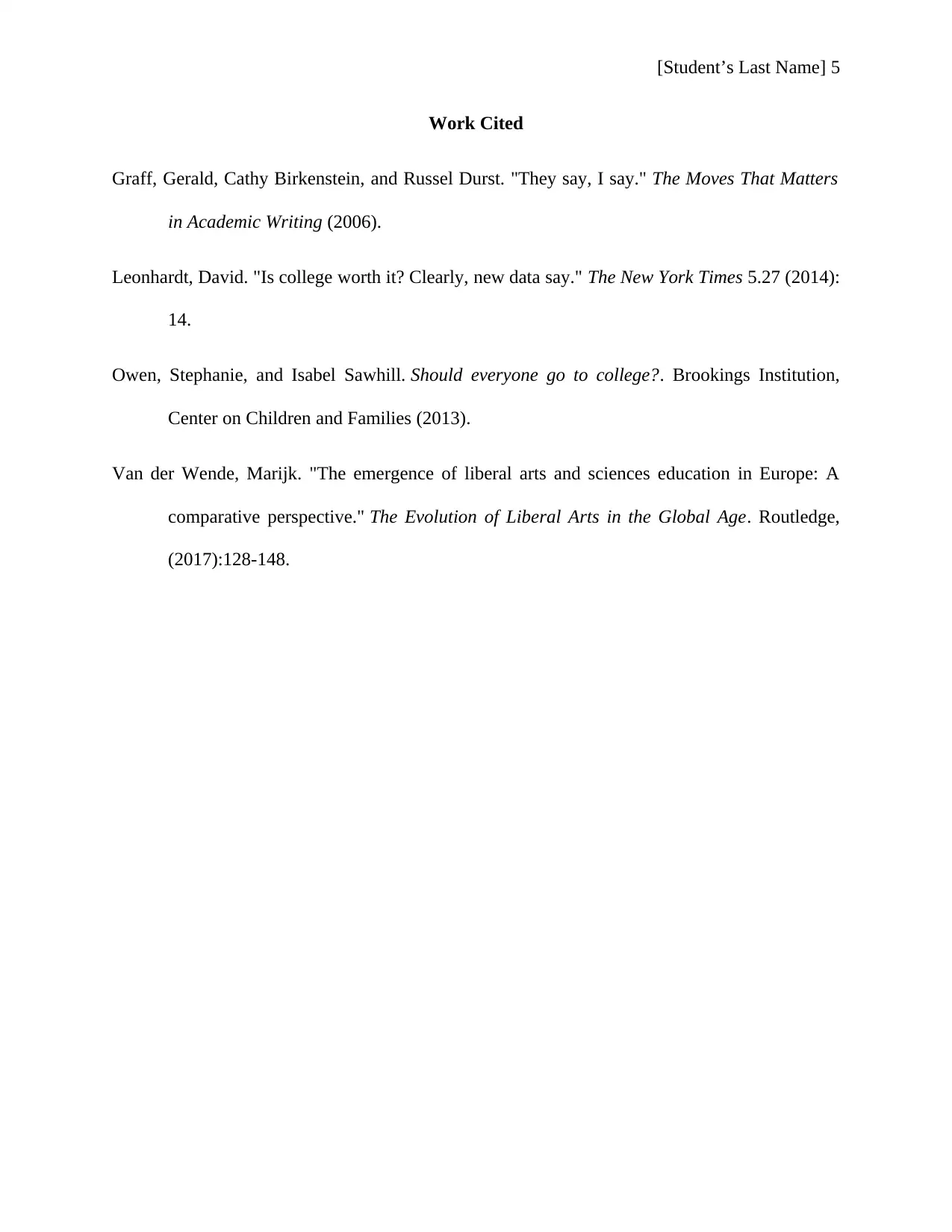
[Student’s Last Name] 5
Work Cited
Graff, Gerald, Cathy Birkenstein, and Russel Durst. "They say, I say." The Moves That Matters
in Academic Writing (2006).
Leonhardt, David. "Is college worth it? Clearly, new data say." The New York Times 5.27 (2014):
14.
Owen, Stephanie, and Isabel Sawhill. Should everyone go to college?. Brookings Institution,
Center on Children and Families (2013).
Van der Wende, Marijk. "The emergence of liberal arts and sciences education in Europe: A
comparative perspective." The Evolution of Liberal Arts in the Global Age. Routledge,
(2017):128-148.
Work Cited
Graff, Gerald, Cathy Birkenstein, and Russel Durst. "They say, I say." The Moves That Matters
in Academic Writing (2006).
Leonhardt, David. "Is college worth it? Clearly, new data say." The New York Times 5.27 (2014):
14.
Owen, Stephanie, and Isabel Sawhill. Should everyone go to college?. Brookings Institution,
Center on Children and Families (2013).
Van der Wende, Marijk. "The emergence of liberal arts and sciences education in Europe: A
comparative perspective." The Evolution of Liberal Arts in the Global Age. Routledge,
(2017):128-148.
1 out of 5
Your All-in-One AI-Powered Toolkit for Academic Success.
+13062052269
info@desklib.com
Available 24*7 on WhatsApp / Email
![[object Object]](/_next/static/media/star-bottom.7253800d.svg)
Unlock your academic potential
Copyright © 2020–2026 A2Z Services. All Rights Reserved. Developed and managed by ZUCOL.